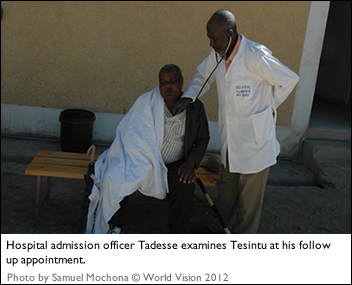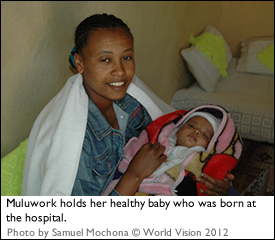World Vision hospital saved my life
By Samuel Mochona
World Vision built a hospital in Mehal Meda, a small town about 280 km north of Ethiopia's capital, Addis Ababa, and equipped it. World Vision has also given an ambulance for emergency cases. The hospital services 358,000 people.
 Tesintu Wolde, a 57-year-old father of seven children, was one of the several people queuing at the outpatient department of Mehal Meda hospital to get medical service. It is first-come, first-serve, but priority is always given to those with serious health problems. An average of 100 people gets medical service every working day in the department.
Tesintu Wolde, a 57-year-old father of seven children, was one of the several people queuing at the outpatient department of Mehal Meda hospital to get medical service. It is first-come, first-serve, but priority is always given to those with serious health problems. An average of 100 people gets medical service every working day in the department.
Tesintu explains why he was in the hospital: "It was 10 years ago. I got sick very seriously and came to this hospital. I have undergone a series of examinations and I was diagnosed to be a diabetic. The examinations also indicated that my cholesterol level and blood pressure were very high. I was very much worried about my health, but the doctor told me that if I carefully followed the medication and advice, I would manage those health problems well.
"Ever since, I come to this hospital regularly to follow up my health condition, get mediation and advice... I could have died 10 years ago, but thanks to the health service of this hospital I am enjoying life and work today… some of my children have gone to school and some of them have completed their studies and [are] living by themselves. I can say this hospital added more than 10 years to my life and enabled me to do so many things to my family and other people around me."
Delivering babies safely
Muluwork Demisse, a 24-year-old woman, with her two months old baby boy in the mothers’ and children’s health department, has come for a checkup.
 As she breastfeeds her baby, she tells her story. "Beginning from early weeks of my pregnancy, I have been receiving medication and support in the hospital. They were examining the fetus in by womb and telling me that it was growing normally. They advised me about …what to eat and what foods to avoid during pregnancy. Finally, the delivery was easy and the labour was not long. And with the help of the medical staff, I gave birth to a healthy baby boy.”
As she breastfeeds her baby, she tells her story. "Beginning from early weeks of my pregnancy, I have been receiving medication and support in the hospital. They were examining the fetus in by womb and telling me that it was growing normally. They advised me about …what to eat and what foods to avoid during pregnancy. Finally, the delivery was easy and the labour was not long. And with the help of the medical staff, I gave birth to a healthy baby boy.”
"Imagine what would have happened if I gave birth at home. There might be bleeding and no mechanism to stop it. Difficulty in cutting umbilical cord or hygienic problems might have caused infection to me or my baby," she added.
"Many women come to the hospital with normal or complicated pregnancies and labour conditions," explains Dr. Biruk Abebe, Medical Director of Mehal Meda hospital. "If they were not assisted to give birth, those women with the complicated cases or their babies might have died."
Apart from pregnancy and delivery, Dr. Biruk remembers one emergency case. He says, "A woman in one of the villages has got a very bad accident. Her name is Sindenesh Bogale. A bull with sharp horns hit her in the stomach and her abdominal organs were almost to be detached out through the opening caused by the accident. Fortunately, they brought her to the hospital and with some medical procedures, her health was restored and her life was rescued.
Hospital built by World Vision saving lives
Dr. Biruk continues, "If this hospital was not established by World Vision here, thousands of people might have been died of preventable diseases, because the other nearest hospital in this area is 150 km away where there is no transport access. For instance, last year about 10,000 patients were given treatment against 10 top diseases such as pneumonia, acute febrile illness, acute respiratory infections and dyspepsia, which are prevalent in the area."
"World Vision has built and equipped this hospital. World Vision has also given ambulance for emergency cases. So many people are getting medication in this hospital since it began service in 1998. The hospital is also giving anti-retroviral treatment to 418 people living with HIV regularly," said hospital admission officer Tadesse Ashagrie, a clinical nurse by training.